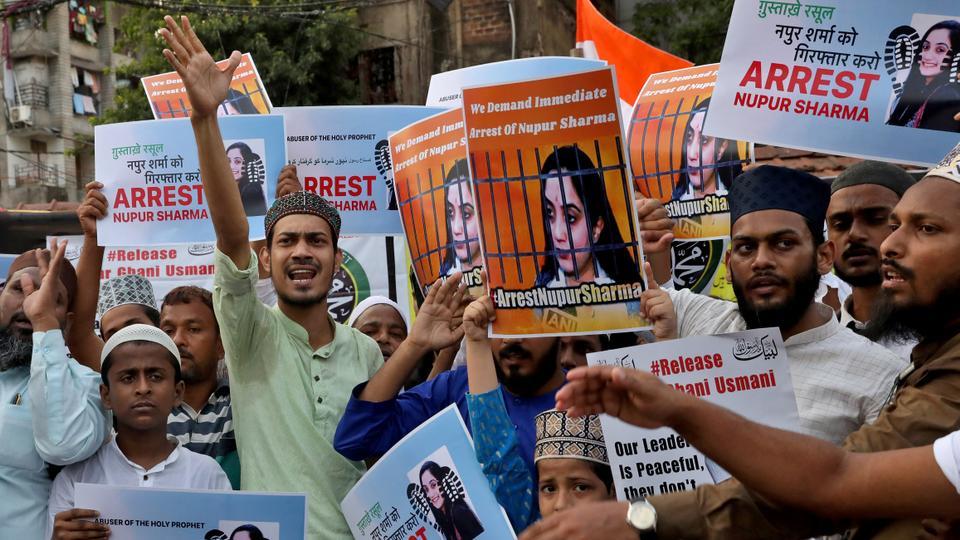Over 30 members and some federal ministers of the Hindu nationalist party, who are authorised to take part in TV debates, asked to be “extremely cautious” when talking about religion, two BJP leaders say.
Leaders of India’s Hindu nationalist ruling party have instructed officials to be “extremely cautious” when talking about religion on public platforms after derogatory remarks about the Prophet Muhammad and his wife Ayesha drew angry protests from Islamic countries.
Two Bharatiya Janata Party [BJP] leaders said on Tuesday the verbal instructions were given to over 30 senior officials and some federal ministers who are authorised to take part in debates hosted by Indian news channels often broadcast live to millions of viewers.
“We don’t want party officials to speak in a way that hurts the religious sentiments of any community … They must ensure the party’s doctrine gets shared in a sophisticated manner,” said a senior BJP leader and federal minister in New Delhi.
READ MORE: India faces uproar after ruling BJP officials insult Prophet Muhammad
Muslims under pressure
India’s minority Muslims have felt more pressure on everything from freedom of worship to hijab head scarves under Prime Minister Narendra Modi’s BJP.
Since he came to power in 2014, Hindu mobs have lynched scores of people — mainly Muslims and Dalit Hindus — suspected of illegally transporting cows or consuming beef.
Hindu far-right groups have targeted Muslims over “love jihad”, the conspiracy theory that Muslims are luring Hindu women with the aim of conversion and eventually national domination.
Muslims were also accused of spreading Covid-19. In recent years, Hindu mobs have targeted Muslims praying on Fridays in northern India.
BJP recently banned wearing the hijab in classrooms in Karnataka state. Hardline Hindu groups later demanded such restrictions in more Indian states. Muslim mutton sellers and fruit vendors have also become the target of the far-right Hindu groups.
During a Hindu festival earlier in April, Hindu mobs pelted stones on mosques in several areas while DJs played loud music outside the mosques as worshippers prayed.
Hindu monks known for their incendiary anti-Muslim rhetoric have been calling for Rohingya-type ethnic cleansing of Indian Muslims.
With about 110 million members, mainly Hindus, the BJP is the world’s largest political party, while Muslims comprise around 13 percent, around 200 million, of India’s 1.35 billion population.
READ MORE: India’s Muslims mark ‘most painful’ Eid after series of far-right attacks
Widespread anger
Last week BJP suspended its spokeswoman Nupur Sharma and expelled another official Naveen Jindal after Islamic nations demanded apologies from the Indian government and summoned diplomats to protest against anti-Islamic remarks made during a TV debate.
Qatar, Saudi Arabia, Oman, the United Arab Emirates, Indonesia, Afghanistan, Pakistan and Iran were among the nations that made their complaints public. Bahrain, Malaysia, Maldives, and Türkiye also expressed outrage over the insulting comments.
The Grand Mufti of Oman described the “obscene rudeness” of Modi’s party toward Islam as a form of “war.” Riyadh said the comments were insulting and called for “respect for beliefs and religions.” And Egypt’s Al-Azhar Mosque, the Sunni world’s foremost institution of religious learning, described the remarks as “real terrorism (that) can plunge the entire world into severe crises and deadly wars.”
The influential 57-member Organisation of Islamic Cooperation (OIC) said in a statement that the insults came in the context of an increasingly intense atmosphere of hatred toward Islam in India and systematic harassment of Muslims.
India, however, rejected the comments by the OIC as “unwarranted” and “narrow-minded.”
Although Modi’s party has denied any rise in communal tensions during his reign, BJP rule has emboldened hardline Hindu groups in recent years to take up causes they say to defend their faith, stoking a rise in anti-Muslim sentiment.
India’s embassies in Qatar and Kuwait released a statement saying the views expressed about the Prophet Muhammad and Islam were not those of the Indian government and were made by “fringe elements.”
US report on anti-minorities policies
The US State Department, in an annual report on international religious freedom released in June, said that attacks on members of minority communities, including killings, assaults, and intimidation, took place in India throughout 2021.
India’s Foreign Ministry said on Monday the offensive tweets and comments did not in any way reflect the government’s views.
“We are not barred from speaking on sensitive religious issues, but we must never insult the basic tenets of any religion,” said senior BJP spokesperson Gopal Krishna Agarwal.
Modi in recent years has improved economic ties with energy-rich Islamic nations, the main source for India’s fuel imports, but relations have come under stress from the anti-Islamic utterances of the two BJP members, foreign policy experts said.
Small-scale protests erupted in parts of India as Muslim groups demanded the arrest of the suspended BJP officials.
READ MORE: US says some Indian officials ‘supporting’ religious attacks
Source: TRT World

 Sports3 days ago
Sports3 days ago
 Sports7 days ago
Sports7 days ago
 News5 days ago
News5 days ago
 World7 days ago
World7 days ago
 News5 days ago
News5 days ago
 News6 days ago
News6 days ago
 News3 days ago
News3 days ago
 News3 days ago
News3 days ago
























